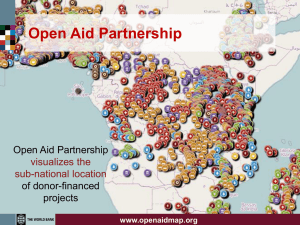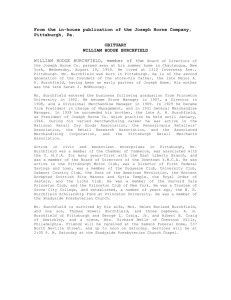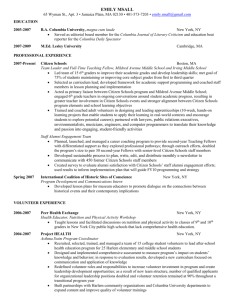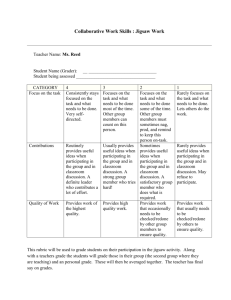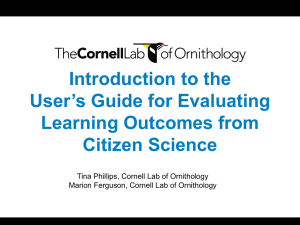Open Data for Regional Planning - Regional Planning for Growth
advertisement
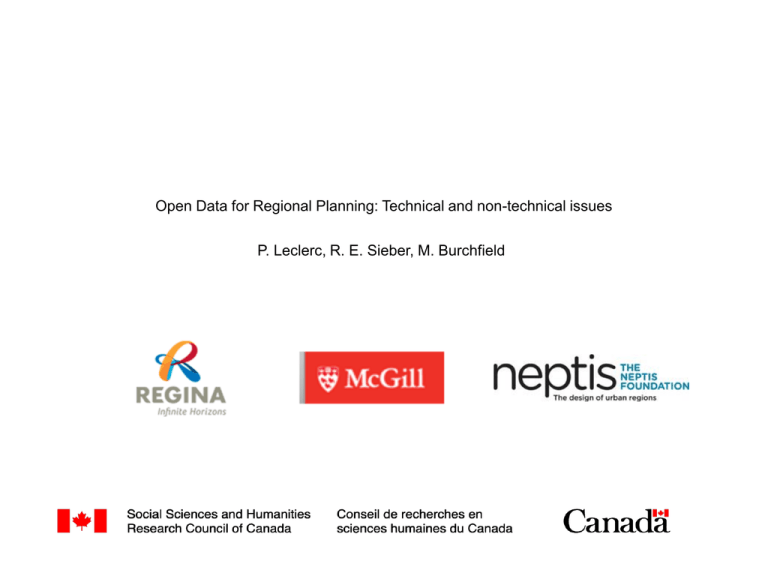
Open Data for Regional Planning: Technical and non-technical issues P. Leclerc, R. E. Sieber, M. Burchfield Our co-presenter, Marcy Burchfield Open Data the idea that certain data should be freely available to everyone to use, reuse and republish as they wish, without restrictions. Data should be collected as close to source as possible, as current as possible, allow for automated processing, available to anyone, free of restrictions, proprietary formats and without licenses, patents, copyright. Open data has multiple audiences: private and public sectors, citizens and social entrepreneurs Regina Open Data Portal And the data looks like this... And this. It’s also about people --> Why OD? Apps for Transit Why OD? Citizen Engagement Why OD? Economic Development Geothink: A grant exploring Open Data Over the next five years, 26 researchers and 30 partners will explore how locationbased technologies, citizen generated content, and government open data may transform the way Canadian cities and citizens communicate with each other. More Information? http://www.geothink.ca. This $5.7million grant is funded by Social Sciences and Humanities Research Council Partnership Grant Program and generous contributions from grant partners. The City of Regina is our main municipal partner. Also Edmonton, Calgary, Toronto... Why Open Data for regional governance and planning? Opening data in the regional planning context enables sharing and collaboration among agencies and engaged stakeholders. Regional planning allows for a common vision in the coordination of activities (e.g., transportation, water management, urban expansion and greenbelts). Opening data can assist not only in the development of a regional plan but also buy-in of the common vision. Impetus for Neptis Geoweb In the Toronto region (made up of over 100 lower-, upperand single-tier municipalities), municipal official plans must conform to not only the Provincial Policy Statement but also a Provincial Growth Plan. We scanned and digitized the future urban settlement area to create a single regional data set. Challenges, Marcy Pie-chart means non-technical challenges outweigh technical challenges, e.g., Integrating data requires a framework to be in place It follows historical relations-- municipalities, region, province, development industry, NGO stakeholders... Boundaries may be fuzzy, yet the technology makes them discrete Open data can reveal the warts Challenges, Renée Opening data reveals the good, the bad and the prospective Open data exists within legal regimes of Intellectual Property, liability and privacy Open data exists in a political economy. Use data to plan but data itself has a value Open data enables citizen engagement Challenges, Philippe Setting the data free Obtaining the standards o collecting and delivering data o creating an apples to apples comparison Conclusion Open data is a paradigm shift. Data that once was the means to the ends of planning now has its own economic and social value. There are multiple benefits and costs. Main take-away is that OD must be built into SOP but it can provide great value for a more open regional planning and governance process. Final thoughts from the presenters.



